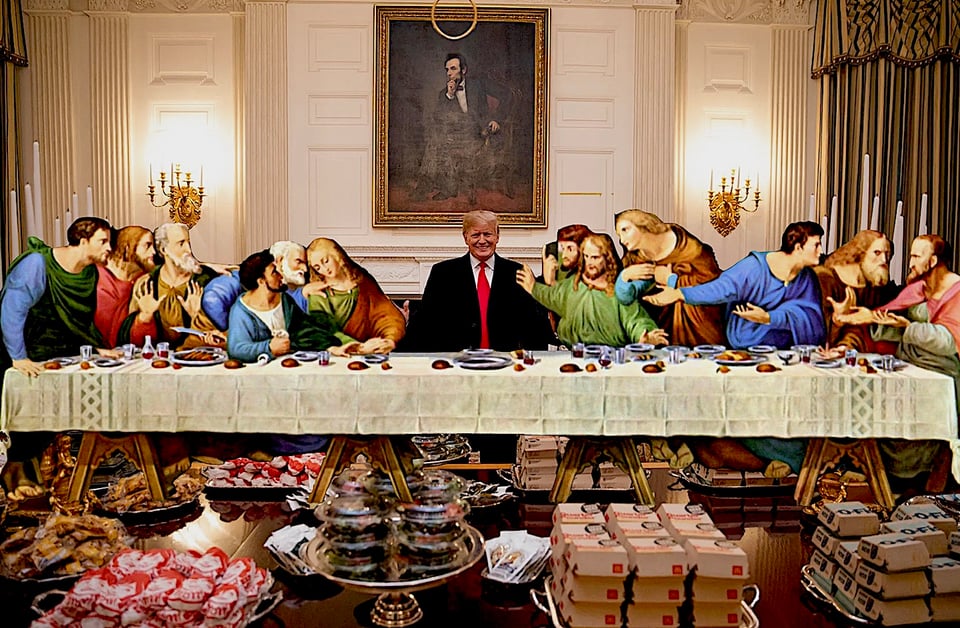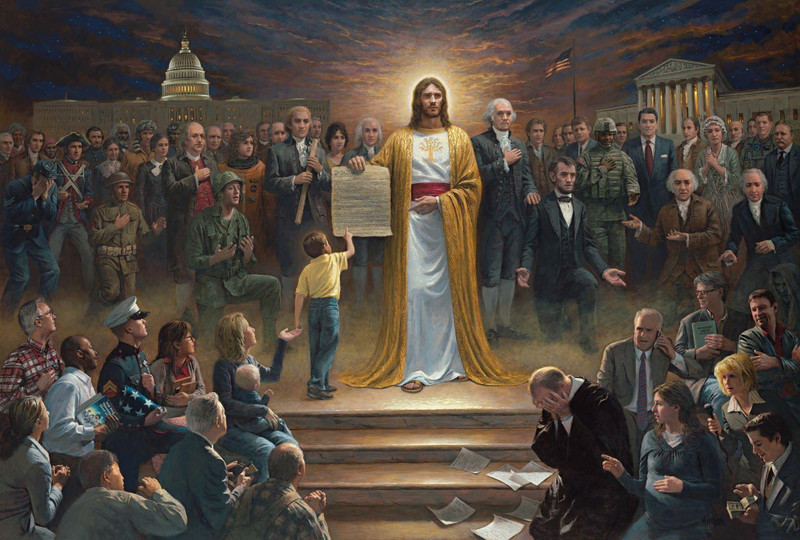A Messiah Anointed with Snake Oil


It’s 2024, and we are all living in a world created by dead televangelists.
Those big men with their waxen faces, made up for klieg lights—the Jerry Falwells, the Oral Roberts, the Jimmy Swaggarts, the Pat Robertsons, and their innumerable successors, have spent the past fifty years shaping a church of the American state that has at last found its apotheosis.
Knitting together religion and politics is tough work; it requires relentless exegesis, a continual onslaught of vitriol and venom, a worldview at once celestial and paranoiac; it requires the shadow of the apocalypse, the war of the spirit, the laying on of hands. It required galvanizing white evangelical Protestants into “worldly” political engagement, a process that began with mass resistance to school integration, evolved into anti-abortion activism, and has, over time, oozed over our judiciary, legislative and executive branches, until abortion has been banned by a Christian-extremist Supreme Court, and both the Speaker of the House and the pseudo-prophesied once-and-future President are proud, declared Christian nationalists. Set aside, for a moment, your skepticism about Trump’s sincerity in his faith. Acknowledge that it may be just another scam, but let that pass; it does not matter; he is not speaking to you. He is speaking to the legions of the faithful that have brought us to this moment, the ones who know that power justifies itself, that accusations of hypocrisy are the mewling of the weak, that faith can move mountains, that it has.
This moment is the zenith of the Christian right’s political project, and its chief product—the culmination of this mammoth project—is yet another remnant of the 1980s media sphere: Donald Trump, selling Bibles, a snake-oil messiah with a string of indictments and a declaration that should he be elected, the church, the state, and his person will be a holy trinity of its own—a trio collapsed into one being.
You can buy the USA Bible for $59.99, a Trump-endorsed creation that embodies, faultlessly, a half-century-long effort to turn the white Christian church in America into a political organ of the right. This good book is not just endorsed by Trump, but also by legendary country singer Lee Greenwood; and for that low price, enfolded in the same book are the sacred documents of America’s civil religion. Or in the words of the sales copy:
GOD BLESS THE USA BIBLE
IN STOCK NOW FOR QUICK SHIPPINGEasy-to-read, large print, and slim design, this Bible invites you to explore God’s Word anywhere, any time. This bible has been designed so that it delivers an easy reading experience in the trusted King James Version translation. This large print Bible will be perfect to take to church, a bible study, work, travel, etc.
This Bible also features a copy of:
Handwritten chorus to “God Bless The USA” by Lee
The US Constitution
The Bill of Rights
The Declaration of Independence
The Pledge of Allegiance

The King James Version is the preferred translation among evangelicals. This same population have created a syncretic, Christian-nationalist faith that views the Constitution and other founding documents of the United States as a kind of holy writ unto themselves; “God Bless the USA,” in this context, becomes a kind of liturgy for that civil religion, one in which the flag, the cross and the policies of the American right are one.
The summation of a half-century of the American right is Christian nationalism, most often expressed as ultra-patriotic Christianity—the kind that condemns immigrants as part of its creed, that takes the American flag as a sacred article, that seeks not to separate church and state but to weld them together with the hot irons used to scald the faithless. It’s their vision, and we’re living in it; it’s their spiritual war, and we’ve been drafted whether we know it or not.
The Sword and the Sandwich is a newsletter about deadly serious extremism and serious sandwiches. Please consider supporting this work with a paid subscription.
It’s no coincidence that Trump has recently begun enfolding sermons and faux-altar calls into his rallies, no coincidence that his Bible’s translation is the approved one, no coincidence that his evocations of Christ (and comparisons of himself to same) have become more and more frequent in recent months. He has adopted the cant of his staunchest supporters, knowing that they are and have been a political bloc whose zealotry is only outstripped by their conformity. His pitch is the ultimate con man’s “believe me, trust me” canto; it transcends his person, and becomes faith in God. He campaigns not as one elected, but as one chosen, anointed in the oil of his believers’ sweat. His position on center stage—so many stages, all across the country, set up for his show of patriotic faith—is the position of the prophet, the catalyst, the creator of the Kingdom of God on earth.
The trouble is that when your political opponents speak as an angelic chorus—a clamor in unison—is that your own ragged coalition sounds threadbare in comparison. The opponents of fascism speak in overlap, contradicting one another, a concatenation of differing interests and different faiths. The serried ranks of the enraptured, by comparison, are fired up by a zeal that does not differentiate between the love of God and hatred of His enemies—that multitudinous rabble, that discord of millions and millions of free wills. Against this aegis of faith—a shield-wall of impervious, overlapping beliefs—it is as difficult to stand as it is necessary: an array of strange weapons is ours, if we take them in hand, a refutation in deed of the excesses of the faith militant.

-
"Knitting together religion and politics is tough work; it requires relentless exegesis, a continual onslaught of vitriol and venom, a worldview at once celestial and paranoiac; it requires the shadow of the apocalypse, the war of the spirit, the laying on of hands. " To whom are you referring: Rev Jesse Jackson, Rev Al Sharpton, Rev Raphael Warnock?
Responding to someone who is willfully misreading and seems to be trolling is undoubtedly a lost cause, but who is referred to is quite clearly labeled in the second sentence of the essay. I don't know what kind of gotcha you imagine you're pulling here, but you aren't.
Add a comment: